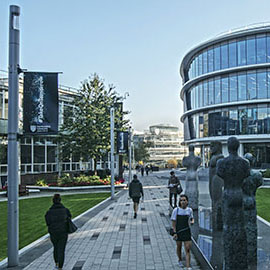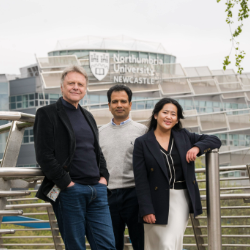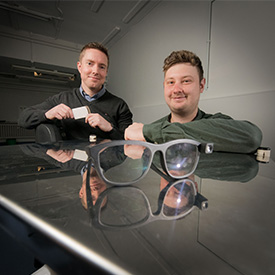-
Study
Study
Interested in studying at Northumbria? With 31,500 students, Northumbria is one of the largest universities in the country, offering courses on either a full-time, part-time or distance learning basis.
Discover more-
Undergraduate
- Undergraduate Study Degree
- Undergraduate Open Day & Events
- Application Guides
- Northumbria University UCAS Exhibitions
- Foundation Years
- Undergraduate Fees & Funding
- School & College Outreach
- Continuing Professional Development
-
Postgraduate
- Postgraduate Study Degree
- Postgraduate Research Degrees
- Postgraduate Open Days and Events
- Postgraduate Fees & Funding
- Flexible Learning
- Thinking about a Masters?
- Continuing Professional Development
- Change Direction
-
Student Life
- The Hub - Student Blog
- Accommodation
- Life in Newcastle
- Support for Students
- Careers
- Information for Parents
- Students' Union
- Northumbria Sport
-
-
International
International
Northumbria’s global footprint touches every continent across the world, through our global partnerships across 17 institutions in 10 countries, to our 277,000 strong alumni community and 150 recruitment partners – we prepare our students for the challenges of tomorrow. Discover more about how to join Northumbria’s global family or our partnerships.
Discover more-
Applying to Northumbria
- European Union
- Our London Campus
- Northumbria Pathway
- International Events
- Entry Requirements
- Agent Network
-
Northumbria Language Centre
- Faculty Requirements
- Acceptable English Requirements
- Pre-Sessional English and Study Skills
- Academic Language Skills Programmes (ALS)
-
International Fees, Funding & Scholarships
- International Undergraduate Fees
- International Undergraduate Funding
- International Masters Fees
- International Masters Funding
- International Postgraduate Research Fees
- International Postgraduate Research Funding
- International Money Matters
-
Life at Northumbria
- International student support
- The Hub - Student Blog
- Careers
-
International Mobility
- Current Northumbria Students
- Incoming Exchange Students
-
-
Business
Business
The world is changing faster than ever before. The future is there to be won by organisations who find ways to turn today's possibilities into tomorrows competitive edge. In a connected world, collaboration can be the key to success.
Discover more -
Research
Research
Northumbria is a research-rich, business-focused, professional university with a global reputation for academic quality. We conduct ground-breaking research that is responsive to the science & technology, health & well being, economic and social and arts & cultural needs for the communities
Discover more -
About Us
-
About Northumbria
- Our Strategy
- Our Staff
- Our Partners
- Student Profiles
- Alumni Profiles
- Leadership & Governance
- Academic Departments
- University Services
- History of Northumbria
- Contact us
- Online Shop
-
-
Alumni
Alumni
Northumbria University is renowned for the calibre of its business-ready graduates. Our alumni network has over 236,000 graduates based in 178 countries worldwide in a range of sectors, our alumni are making a real impact on the world.
Discover more - Work For Us
What will I learn on this module?
You will learn to work independently, perform systems thinking, and bring together your specialist knowledge and skills within a research and development project. You will work with the guidance of a tutor to direct your learning and develop your abilities in areas such as project planning and management, detailed design of the proposed method, prototype fabrication or virtual system modelling and critical evaluation and identification of further developments. You will be provided with the opportunity to demonstrate to potential future employers the breadth and depth of your ability by not only using your specialist abilities, but also through the demonstration of your planning, organisational and independent working skills. You will be expected to incorporate unfamiliar knowledge as well as the wider social and environmental considerations of the engineering profession.
How will I learn on this module?
You will be guided through a process of individual reflection where both what you learn and how you learn will be documented, and the learning journey will be supported by supervisor feedback through regular meetings. During the project you will use your research and critical evaluation skills to investigate an engineering problem and design a methodology for continued investigation of the topic through your team activities and therefore organisational tools will be provided for planning, recording and sharing through the eLP. Fundamentally the process of undertaking this project offers the mechanism for experiential learning.
How will I be supported academically on this module?
During this independent research project, support for your learning will be provided by an academic mentor who will provide regular guidance and where appropriate engagement with the relative research group within the department. Professional support staff, such as Ask4Help, provide the first point of contact for a range of queries, including, for example, those concerning assessment submission, late submission/extensions, and other administrative issues.
What will I be expected to read on this module?
All modules at Northumbria include a range of reading materials that students are expected to engage with. The reading list for this module can be found at: http://readinglists.northumbria.ac.uk
(Reading List service online guide for academic staff this containing contact details for the Reading List team – http://library.northumbria.ac.uk/readinglists)
What will I be expected to achieve?
Knowledge & Understanding:
MLO1. Select and critically evaluate technical literature and other sources of information to solve complex problems. (M4)
Intellectual / Professional skills & abilities:
MLO2. Select and apply appropriate computational and analytical techniques to model complex problems, discussing the limitations of the techniques employed. (M3)
MLO3. Use a risk management process to identify, evaluate and mitigate risks (the effects of uncertainty) associated with a particular project or activity. (M9)
MLO4. Design solutions for complex problems that evidence some originality and meet a combination of societal, user, business and customer needs as appropriate. (M5)
Personal Values Attributes (Global / Cultural awareness, Ethics, Curiosity) (PVA):
MLO5. Apply creativity and curiosity to formulate and analyse complex problems to reach substantiated conclusions. (M2)
MLO6. Identify and analyse ethical concerns and make reasoned ethical choices informed by professional codes of conduct. (M8)
MLO7. Communicate effectively on complex engineering matters with technical and non-technical audiences, evaluating the effectiveness of the methods used. (M17)
How will I be assessed?
Formative Assessment
Formative feedback on your project progress will be provided through weekly meetings with your project mentor.
Summative Assessment
The approval of the research project topic requires it to be within the scope of their named programme route (e.g. Engineering Management, Mechanical Engineering, and Renewable and Sustainable Energy Technology).
There are 3 summative assessment components in this module:
Component 1. A pass/fail assessment requires the completion and approval of mandatory project planning documents that will partially meet MLOs 3 and 6.
Component 2. A dissertation report (10,000 words or equivalent) that will be assessed against all MLOs.
Component 3. An oral presentation (10 to 20 Min or equivalent) with question-and-answer session, that will be assessed against MLO 7, and partially meet MLOs 1, 3, 4, and 5.
Feedback will be provided electronically through the eLP within 20 working days of the date of submission.
Pre-requisite(s)
N/A
Co-requisite(s)
N/A
Module abstract
This module is the culmination of your postgraduate programme; it provides an extended opportunity for you to bring together your specialist knowledge and skills within a engineering and technology research project aligned with the core principles of your programme subject area. You will be given the opportunity to demonstrate the high-level skills that will enhance your employability and prepare you for lifelong learning. The research project will have a topic of your choice subject to approval, and you will be involved in the design and development of technical solutions to a complex problem before delivering a critical analysis of the solution.
The approval of the research project topic requires it to be within the scope of their named programme route (e.g. Engineering Management, Mechanical Engineering, and Renewable and Sustainable Energy Technology). Upon successful completion, you will be able to demonstrate an ability to conduct research and organize the findings into a comprehensive formal original research report. This will require you to critically evaluate your contribution to current knowledge and understanding of your chosen topic area.
Course info
Credits 60
Level of Study Postgraduate
Mode of Study 2 years full time (with advanced practice in second year)
2 other options available
Department Mechanical and Construction Engineering
Location City Campus, Northumbria University
City Newcastle
Start September 2024 or January 2025
All information is accurate at the time of sharing.
Full time Courses are primarily delivered via on-campus face to face learning but could include elements of online learning. Most courses run as planned and as promoted on our website and via our marketing materials, but if there are any substantial changes (as determined by the Competition and Markets Authority) to a course or there is the potential that course may be withdrawn, we will notify all affected applicants as soon as possible with advice and guidance regarding their options. It is also important to be aware that optional modules listed on course pages may be subject to change depending on uptake numbers each year.
Contact time is subject to increase or decrease in line with possible restrictions imposed by the government or the University in the interest of maintaining the health and safety and wellbeing of students, staff, and visitors if this is deemed necessary in future.
Your Learning Experience
Find out about our distinctive approach at
www.northumbria.ac.uk/exp
Admissions Terms and Conditions
northumbria.ac.uk/terms
Fees and Funding
northumbria.ac.uk/fees
Admissions Policy
northumbria.ac.uk/adpolicy
Admissions Complaints Policy
northumbria.ac.uk/complaints














